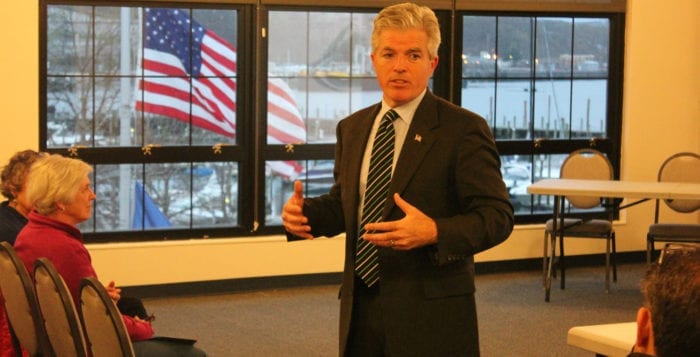Suffolk County makes grants available to upgrade outdated septic systems
For a few hundred dollars annually, Suffolk County residents now have the option to take a step to improve the quality of Long Island waters.
County Executive Steve Bellone (D) urged homeowners at a town hall meeting at Port Jefferson Village Center April 27 to get on board with a new grant and loan program that will help make the installation of state-of-the-art, nitrogen-reducing septic systems more affordable.
Bellone said the new systems, which would replace the 360,000 outdated and environmentally harmful septic tanks and leaching systems installed in a majority of homes across the county, are the next step in a years-long initiative to reclaim Long Island’s water.
Brookhaven Town amends nitrogen protection zone law
By Alex Petroski
In June 2016, the Brookhaven Town board voted unanimously to approve a local law proposed by Supervisor Ed Romaine (R) that established nitrogen protection zones within 500 feet of any body of water on or around Long Island. The zones prohibit new structures or dwellings being built in that range from installing cesspools or septic systems, which took effect in January.
At a board meeting last week, an amendment was passed that will allow the board to adjust the former law, which allows for 19 milligrams of nitrogen per liter of water discharged from new septic systems or cesspools. This will come following the release of new technology that will make lowering the amount of nitrogen possible. It is uncertain what the new level may be, but once the town knows what it is, the board will be able to lower the limit immediately with the new amendment. Without the amendment, the limit would have to have waited to be put into effect Dec. 1.
“This law says we’ll meet the standard, but the minute there’s a lower standard, we will go with the lowest possible standard,” Brookhaven Supervisor Ed Romaine (R) said during a public hearing on the amendment April 27.
Mary Anne Johnston of the Affiliated Brookhaven Civic Association commended the town’s actions during the hearing.
When the law was initially passed in 2016, Romaine spoke about the importance of limiting nitrogen in Long Island’s waters.
“We’ve all watched our waters degrade over the last 50 years,” Romaine said after the vote at a town board meeting held on June 9, 2016. “We all know part of the problem is nitrogen…the solutions to this problem are neither easy nor cheap. But doing nothing is not an option; we must act now. Our future depends on us addressing this problem.”
“Water quality is everything to us here — it’s our quality of life, our heritage, our economy, tourism economy, our recreation and what we drink,” Bellone told a roomful of residents in Port Jefferson. “We need to retrofit those homes to protect our environment and reverse decades of water quality decline. We will lose another generation here if this is not done right and we’re very focused on making sure we do this right.”
Under the Suffolk County Septic Improvement Program, Bellone and Deputy County Executive Peter Scully told attendees individual homeowners can apply for grants administered by the county’s department of health services, which will approve permits, perform inspections and supervise system installations. Loans, administered by the nonprofit Community Development Corporation of Long Island, offer homeowners low-cost financing for up to $10,000.
To cover the $17, 850 total cost of installation, eligible homeowners would be given an $11,000 grant — $10,000 for the installation of the individual alternative on-site wastewater treatment systems and $1,000 for a pressurized shallow drain field. Homeowners would pay the balance with a 15-year, fixed 3 percent loan.
The program primarily targets single-family, owner-occupied residences served by a septic system or cesspool. It excludes employees of the county, including elected officials or officeholders.
Charlie McAteer, a retired Port Jefferson Station resident and a member of the Port Jefferson Station/Terryville Civic Association, said his home’s septic system is among the 360,000 that are a few decades old now. He said he and his wife showed up to the town hall meeting to gain more information on the grant program.
“We want to investigate it a bit more — see if it’s viable and economically feasible,” McAteer said. “We just have to do some numbers-crunching and see if it makes sense in our particular parcel and then see if we would qualify.”
Ed Bram, from Port Jefferson, expressed concerns the county isn’t reaching out to the right group of people, as many in the room were already environmentally aware.
“We all think it’s a wonderful idea…so it’s sort of like preaching to the choir,” Bram said. “The general public out there has a different nature of thinking. I think the county is trying their best at doing something for the environment but going about it the wrong way.”
It’s a legitimate concern, Scully responded.
“There’s an education piece to this that people need to come to grips with,” Scully said. “It’s important for people to speak up.”
The County Executive hopes the project can get underway July 1, with 400 homeowners to be selected to receive funding in the first two years of the program.
Homeowners can contact [email protected]. for more information.







